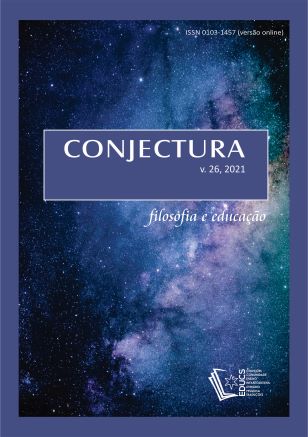Education in the information society: contributions to an emancipatory practice
DOI:
https://doi.org/10.18226/21784612.v26.e021038Abstract
This article deals with education in the context of the information society, aims to identify challenges that fall on the educational field, especially with regard to the instrumentalization of education by capital, the implications that affect the training and teaching performance, as well as the influences of expansion information and communication technologies, reverberating in the current ways of conceiving educational processes. These challenges are evidenced in the light of Critical Theory, more specifically supported in the conceptual categories Bildung (formation) and Halbbildung (semiformation) by Adorno, in the essay Theory of Semiculture (2005). It comprises a bibliographic research, of an analytical character, which made it possible to dialogue with scholars from Theodor Adorno and from Critical Theory, defending the discussions around institutionalized semiformation and the failure of training in the face of the interferences of the cultural industry, as a way to resist oppressive forces and standardization requirements imposed by the current order. Believes that education in the information society is, in many respects, linked to neoliberal economic and ideological interests, resulting in semitraining, compromising the true mission of school education and of human training, resulting in semi-training, devaluation and emptying of importance of the educational institutions and your professionals. It concludes that utilitarian and pragmatic education contributes to the permanence of a social arrangement that leads subjects to critical inability, loss of identity, submission, insensitivity towards themselves and others, regression and limitation of human potential, that once alienated prevents the break with the processes of manipulation and standardization of behaviors that lead to barbarism.
Keywords: Education. Information society. Formation Semiformation. Emancipatory education.
References
ADORNO, Theodor. Teoria da Semicultura. Revista Primeira Versão. Ano IV, nº 191, Porto Velho, maio/agosto, 2005. Disponível em: http://www.primeiraversao.unir.br/artigos_ pdf/191_.pdf. Acesso em: 2 nov. 2019.
BARJA, Paulo Roxo; LEMES, Cláudia Regina. Por que ler Adorno hoje? Uma reflexão sobre a semiformação institucionalizada. Linha Mestra, n. 36, p. 197-200, 2018. Disponível em: http://lm.alb.org.br/index.php/lm/article/view/97. Acesso em: 2 nov. 2019.
BARRETO, Raquel Goulart. Tecnologia e educação: trabalho e formação docente. Educação & Sociedade, v. 25, n. 89, p. 1181-1201, 2004. Disponível em: http://www.scielo.br/pdf/%0D /es/v25n89/22617.pdf. Acesso em: 4 nov. 2019.
BURCH, Sally. Sociedade da informação/Sociedade do conhecimento. In: AMBROSI, Alain; PEUGEOT, Valérie; PIMIENTA, Daniel. Desafios de palavras: enfoques multiculturais sobre as Sociedades da Informação. Paris: C & F Éditions, 2005. Disponível em: http://www.dcc.ufrj.br/~jonathan/compsoc/Sally%20Burch.pdf. Acesso em: 2 nov. 2019.
CONDE, César Augusto Galvão Fernandes. Desinformação: qualidade da informação compartilhada em mídias sociais. 2018. 108f. Dissertação (Mestrado em Ciência da Informação) – Universidade Estadual de Londrina, Londrina, 2018. Disponível em: http://bdtd.ibict.br/vufind/Record/UEL_404aafa775735b45a48037 7f15d284d5. Acesso em: 2 nov. 2019.
JAEHN, Lisete. Semi-formação e formação cultural. ETD: Educaçao Temática Digital, v. 10, n. 1, p. 114-132, 2008. Disponível em: https://dialnet.unirioja.es/descarga/articulo/ 4856132.pdf. Acesso em: 5 nov. 2019.
LEITE, Leonardo Ripoll Tavares. Confiabilidade Informacional: a Filosofia da Informação e o desenvolvimento da leitura crítica no ambiente virtual. 2018. 129 f. Dissertação (Mestrado Profissional em Gestão de Unidades de Informação) – Programa de Pós-Graduação em Gestão da Informação, Universidade do Estado de Santa Catarina, Florianópolis, 2018. Disponível em: http://www.faed.udesc.br/arquivos/id_submenu/3015/confiabilidade_ informacional.pdf. Acesso em: 2 nov. 2019.
LOUREIRO, Robson. Aversão à teoria e indigência da prática: crítica a partir da filosofia de Adorno. Educação & Sociedade, v. 28, n. 99, p. 522-541, 2007. Disponível em: https://www.redalyc.org/pdf/873/87313705012.pdf. Acesso em: 5 nov. 2019.
MAAR, Wolfgang Leo. Adorno, semiformação e educação. Educação & Sociedade, v. 24, n. 83, p. 459-475, 2003. Disponível em: http://www.scielo.br/pdf/es/v24n83/a08v2483. Acesso em: 2 nov. 2019.
SOUZA, Elisabete Gonçalves. Sociedade da informação e reestruturação produtiva: crítica à dimensão utilitarista do conhecimento. Transinformação, v. 23, n. 3, p. 219-226, 2011. Disponível em: http://www.scielo.br/scielo.php?pid=S0103-37862011000300004&script=sci _arttext. Acesso em: 4 nov. 2019.
ZUIN, Antonio Álvaro Soares. Sobre a atualidade do conceito de indústria cultural. Cadernos Cedes, ano XXI, nº 54, agosto, 2001. Disponível em: http://www.scielo.br/scielo.php?pid= S0101-32622001000200002&script=sci_abstract&tlng= pt. Acesso em: 2 nov. 2019.
Downloads
Published
How to Cite
Issue
Section
License
1. The publication of the originals will imply the assignment of copyright to Conjectura Journal.
2. Texts cannot be reproduced without authorization from the Journal after acceptance.









